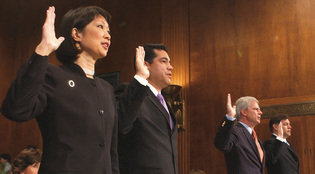 loading
loading
Where They Are NowA fired prosecutor speaks AP ImagesFormer US Attorney Carol Lam ’81 (left) was one of four prosecutors who testified about their firing before the Senate Judiciary Committee on March 6, 2007. The others, left to right, were David Iglesias, John McKay, and H. E. "Bud" Cummins. View full imageOn December 7, 2006, the United States Attorney for the Southern District of California—Carol Lam ’81—received a call from the director of U.S. Attorneys in Washington, DC. After thanking Lam for her service, he asked her to submit her resignation the following month. At the time, Lam didn't know that six of her colleagues were receiving the same message that day—or that those unprecedented dismissals would lead to the resignation of her boss, U.S. attorney general Alberto Gonzales, and a congressional investigation that is still active today. Y: What was your initial reaction to the news? L: My first reaction was that something very unprecedented and ill-advised was happening. I had worked at the department by that time for close to 17 years. You gain an understanding of the way things are done historically and traditionally. The understanding among U.S. Attorneys was that, barring misconduct or some serious problem in judgment or in the exercise of [their] duties, their tenure in the office would be parallel to the tenure of the current administration. U.S. Attorneys are meant to exercise their independent judgment to the best of their abilities, and they're to do that objectively, without fear or concern that if they make an unpopular decision their jobs will be at stake. Y: Did you have any sense of a problem before this? L: No. That's not to say that there was not always a dialogue going on with the Justice Department, particularly about the border, which is one of the huge challenges that face every administration. Y: In June 2006, the attorney general's chief of staff directed an underling to “have a heart-to-heart with Lam about the urgent need to improve immigration enforcement.” His e-mail continued, “If she balks on any of the foregoing or otherwise does not perform in a measurable way by July 15 (my date) remove her.” What was your reaction when you learned of that e-mail? L: It remains very mysterious to me. There never was any heart-to-heart talk with me. In fact, the budgets we were receiving from the Justice Department for immigration enforcement had been shrinking for three years, but we were managing to do thousands of immigration and border prosecutions as well as some really groundbreaking investigations and employer-sanctions cases. This appears to just be another misguided and uninformed e-mail. Y: Another rationale that the administration offered for the dismissal was that your office had not prosecuted enough illegal gun crimes. Was this specific complaint ever expressed to you? L: I had a discussion with Jim Comey, who was the deputy attorney general under Ashcroft and then for a while under Gonzales. I explained to him that the illegal gun problem in San Diego was not very large and that serious gun crimes were handled very effectively by the district attorney's office. I talked to both the police chief and the sheriff, and they said they were very satisfied with the job that the district attorney was doing. I explained that to the deputy attorney general and he said, “I understand. That makes sense.” Y: Of course, the Justice Department is still under investigation for its dismissal of you and the six other U.S. Attorneys. What has it been like to be at the center of a congressional investigation into the administration and one of the biggest media stories of the year? L: The investigation has now expanded in scope and includes allegations and admissions of politicized hiring of career employees. It has been a terrible time for the Department of Justice, an institution that I love and to which I've devoted most of my career. Y: Do you worry that the department will be used as an instrument for political gain in the future? L: The Department of Justice is a wonderful institution. For the most part, it is staffed by truly dedicated public servants. But even on its finest day, it is constantly having to balance the forces of law, history, tradition, and, yes, politics. I think that a lot of people learned many hard lessons from this. Y: In November 2005, Republican congressman Randy Cunningham pleaded guilty to steering Pentagon contracts to friends in exchange for $2.4 million. Hours after entering his plea, he resigned from Congress. What was it like for you to oversee such a politically sensitive case? L: The Cunningham case was simply a good case. Strong on the facts and strong on the law. For a prosecutor, if you're doing your job the right way, there shouldn't be much difference between a high-profile case and a more common case. Politics are simply not relevant to the case. Y: You are now legal counsel at Qualcomm—not a bad feat considering you didn't know you were going to be losing your job. Do you like it? What do you do there? L: I help supervise intellectual property litigation, which requires that I delve into the world of electrical engineering. If you knew how I feared the electronics class I took at Yale you'd give me credit for doing that at my advanced age. Y: Your teacher would be proud. L: More astonished, I think. Y: Would you consider returning to government? L: I'm not ruling anything in or ruling anything out. I loved my years of service to the government but I'm very happy where I am right now.
The comment period has expired.
|
|